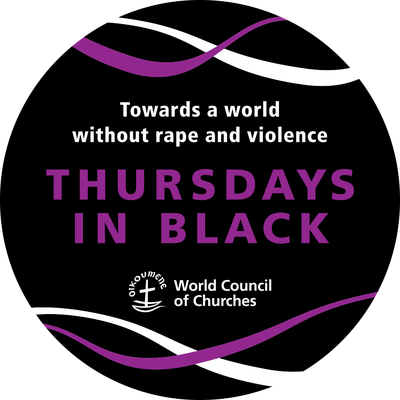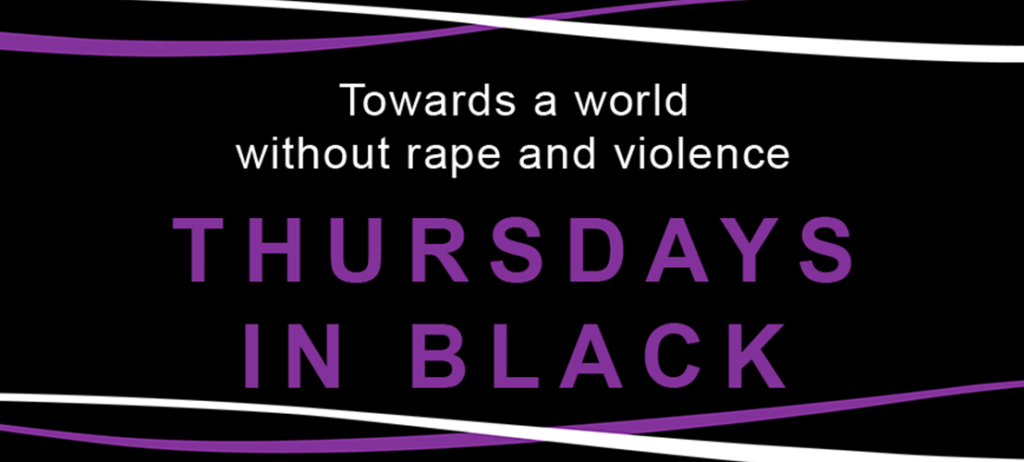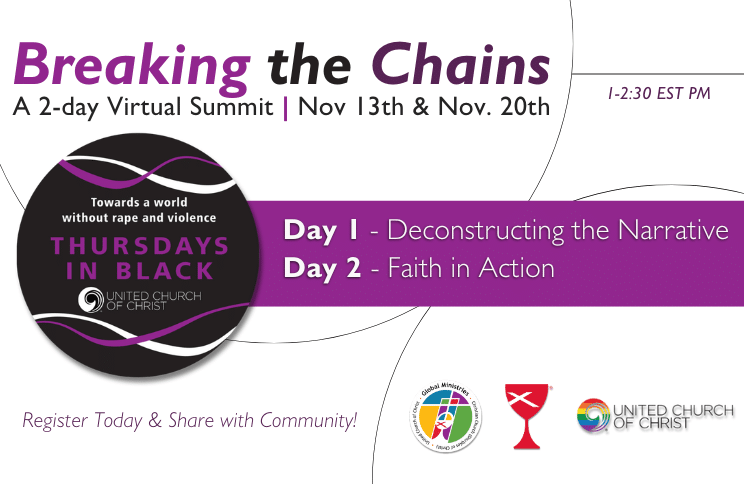Thursdays in Black Campaign

In every country, gender-based violence is a tragic reality. This violence is frequently hidden, and victims are often silent, fearing stigma, and further violence. Globally, 1 in 3 women experience physical or sexual violence by an intimate partner in their lifetime, according to data from the World Health Organization.
Thursdays in Black grew out of the World Council of Churches (WCC) Decade of Churches in Solidarity with Women (1988-1998), in which the stories of rape as a weapon of war, gender injustice, abuse, violence, and many tragedies that grow outward from such violence became all the more visible. But what also became visible was women’s resilience, agency, and personal efforts to resist such violations.
Join Global Ministries and our partners in the Thursdays in Black campaign.
Pray
On Thursdays, we remember survivors, lament the pain caused by gender-based violence, and commit ourselves to awareness, action, and hope. Pray for healing for those who have been harmed, courage for those who speak out, and wisdom for leaders and communities to bring about justice and safety for all.
Prayer:
God of compassion and justice, we lift before you all who suffer from violence and fear. Surround them with your healing love. Strengthen us to stand in solidarity, to speak truth, and to work for a world where every person is safe, valued, and free. Amen.
Give
Empowering women and girls is more than securing a better income for families. It’s creating a world where women are less likely to be abused, more likely to be educated, and more likely to have control over their health and reproductive choices. Give to partners and projects that empower women and girls.
Learn
Many of our global partners are working in their communities to prevent or respond to gender-based violence.
In Africa, Ons Plek (Our Place) is the only intake shelter just for girls in Cape Town. Ons Plek provides these girls with a safe environment and shelter, while providing appropriate programs based on an assessment of each girl’s circumstances. Ons Plek’s levels of care include the intake shelter, doing comprehensive assessment and development care, Siviwe, a second-phase shelter focusing on therapy and development, and Ukondla, a community project to keep girls with their families to prevent their move to the streets. Ukondla focuses on homework help, realizing that girls often drop out of school as a precursor to “dropping out of home.”
In East Asia and the Pacific, the PROK and their project, Durebang (My Sister’s Place), in South Korea, has been a place of compassion and support, as well as a resource center for women from domestic abuse situations and victims of human trafficking. They primarily work with Korean and migrant women who have been forced and/or deceived into working in camptowns and red-light districts near U.S. military bases. Durebang is there for the women who are afraid and need help to leave a difficult situation at home or work, for the women marginalized from society and family and living alone, and for the women who need medical and legal assistance and psychological care.
In Latin America and the Caribbean, FOPJ and its project, House of Hope, work with child laborers as domestic servants (restaveks) and also assist young mothers, girls, and elderly women who have been abandoned by providing them with a safe place where they can attend school, gain social skills like conflict resolution, and learn a professional trade. Medical care and food assistance are also provided to the elderly adults they serve.
In the Middle East and Europe, the Coptic Evangelical Organization for Social Services (CEOSS) has been working for many decades to prevent female genital mutilation and early marriage, as well as projects helping empower women in their communities. This work is culturally sensitive based on the needs of each community. It includes support for educating girls, community awareness and education, and training and capacity-building in communities, which includes providing microenterprise loans to women.
In Southern Asia, GMIT and its project, Rumah Harapan (House of Hope), in Indonesia, have a vision to create a society free of modern slavery, human trafficking, and gender-based violence. They accompany people in their local communities who have experienced domestic violence, human trafficking, and the families of migrant workers who were killed overseas by providing counseling, shelter, prayer services, occupational therapy, legal consultation, reintegration, and food packages. They also have community-based projects that seek to prevent human trafficking and domestic violence.
Resources and information from the World Council of Churches
Zoom Backgrounds for Thursdays in Black (right click to save)
 |  |
News
AACC’s Statement on Condemnation of The Rising Femicide and GBV Cases in Africa
This article was originally shared here. Global Ministries cares deeply about the Thursdays in…
Read MoreBreaking the Chains
Watch intentional learning on Gender & Sexual Based Violence through the lens of Thursdays in…
Read MoreAll Africa Conference of Churches Male Champion for Gender Justice receives the 2024 Women of Substance Award for promoting Gender Equality in Malawi
Originally shared by the All Africa Conference of Churches (AACC) here. With the intention of…
Read More


